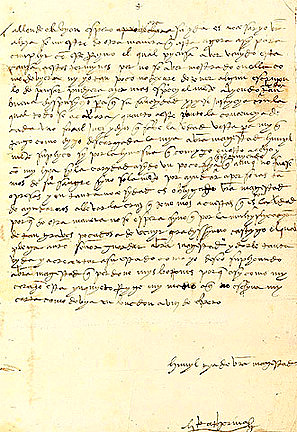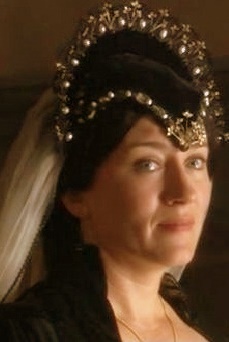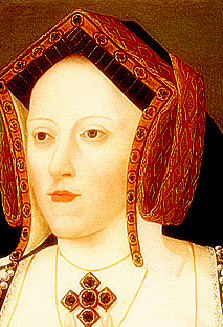Katherine of Aragon in her own words
Jump to navigation
Jump to search
| | The Letters of "A queen I am and a queen I will die" | |
 This 3 page letter that Katherine penned to her nephew, Roman Emperor Charles V in 1534, where she begs him to ask Pope Clement VII to uphold her marriage to Henry was purchased by a private American buyer at Sotheby's in New York for US$156,000 in December, 2006. Arguably, called the letter that changed history. "It is an extraordinary letter," said Marsha Malinowski of Sotheby's in New York. "It is so rare to have someone of such high standing write in her own hand, not using a secretary. Her handwriting is very clear and her diction is so poignant, she had a very good command of her emotions. She was also obviously very well educated. She comes across as very calculated and strong and bright. It is a very powerful letter on so many levels." Catherine was 39 when she wrote the letter, which is one of only two by Henry's first wife to appear at auction for more than 20 years. [source: the UK Guardian newspaper] |
LINKS:
|
| Letter to her father, King Ferdinand II of Aragon, 2nd December 1505 (original was written in Spanish) Most high and most puissant lord, Hitherto I have not wished to let your highness know the affairs here, that I might not give you annoyance, and also thinking that they would improve; but it appears that the contrary is the case, and that each day my troubles increase; and all this on account of the doctor de Puebla, to whom it has not sufficed that from the beginning he transacted a thousand falsities against the service of your highness, but now he has given me new trouble; and because I believe your highness will think I complain without reason, I desire to tell you all that has passed. Your highness shall know, as I have often written to you, that since I came into England, I have not had a single maravedi, except a certain sum which was given me for food, and this such a sum that it did not suffice without my having many debts in London; and that which troubles me more is to see my servants and maidens so at a loss, and that they have not the wherewith to get clothes; and this I believe is all done by hand of the doctor, who, notwithstanding your highness has written, sending him word that he should have money from the king of England, my lord that their costs should be given them, yet, in order not to trouble him, will rather entrench upon and neglect the service of your highness. Now, my lord, a few days ago, donna Elvira de Manuel asked my leave to go to Flanders to be cured of a complaint which has come into her eyes, so that she lost the sight of one of them; and there is a physician in Flanders who cured the infanta donna Isabel of the same disease which which she is affected. She labored to bring him here so as not to leave me, but could never succeed with him; and I, since if she were blind she could not serve me, durst not hinder her journey. I begged the king of England, my lord, that until our donna Elvira should return his highness would command that I should have, as a companion, an old English lady, or that he would take me to his court; and I imparted all this to the doctor, thinking to make of the rogue a true man; but it did not suffice me - because he not only drew me to court, in which I have some pleasure, because I had supplicated the king for an asylum, but he negotiated that the king should dismiss all my household, and take away my chamber-equipage, and send to place it in a house of his own, so that I should not in any way be mistress of it. And all this does not weigh upon me, except that it concerns the service of your highness, doing the contrary of that which ought to be done. I entreat your highness that you will consider that I am your daughter, and that consent not that on account of the doctor I should have such trouble, but that you will command some ambassador to come here, who may be a true servant of your highness, and for no interest will cease to do that which pertains to your service. And if in this your highness trusts me not, do you command some person to come here, who may inform you of the truth, and then you will have one who will better serve you. As for me, I have had so much pain and annoyance that I have lost my health in a great measure; so that for two months I have had severe tertian fevers, and this will be the cause that I shall soon die. I supplicate your highness to pardon me that I presume to entreat you to do me so great favor as to command that this doctor may not remain; because he certainly does not fulfill the service of your highness, which he postpones to the service of the worst interest which can be. Our Lord guard the life and most royal estate of your highness, and ever increase it as I desire. From Richmond, the second of December. My lord, I had forgotten to remind your highness how you know that it was agreed that you were to give, as a certain part of my dowry, the plate and jewels that I brought; and yet I am certain that the king of England, my lord, will not receive anything of plate nor of jewels which I have used; because he told me himself that he was indignant that they should say in his kingdom that he took away from me my ornaments. And as little may your highness expect that he will take them in account and will return them to me; because I am certain he will not do so, nor is any such thing customary here. In like wise the jewels which I brought from thence [Spain] valued at a great sum. The king would not take them in the half of the value, because here all these things are esteemed much cheaper, and the king has so many jewels that he rather desires money than them. I write thus to your highness because I know that there will be great embarrassment if he will not receive them, except at less price. It appears to me that it would be better if your highness should take them for yourself, and should give to the king of England, my lord, his money. Your highness will see what would serve you best, and with this I shall be most content. The humble servant of your highness, who kisses your hands. |
| Letter as Queen Regnant to her husband, King Henry VIII, 16th September, 1513 Sir, My Lord Howard hath sent me a letter open to your Grace, within one of mine, by the which you shall see at length the great Victory that our Lord hath sent your subjects in your absence; and for this cause there is no need herein to trouble your Grace with long writing, but, to my thinking, this battle hath been to your Grace and all your realm the greatest honor that could be, and more than you should win all the crown of France; thanked be God of it, and I am sure your Grace forgetteth not to do this, which shall be cause to send you many more such great victories, as I trust he shall do. My husband, for hastiness, with Rougecross I could not send your Grace the piece of the King of Scots coat which John Glynn now brings. In this your Grace shall see how I keep my promise, sending you for your banners a king's coat. I thought to send himself unto you, but our Englishmens' hearts would not suffer it. It should have been better for him to have been in peace than have this reward. All that God sends is for the best. My Lord of Surrey, my Henry, would fain know your pleasure in the burying of the King of Scots' body, for he has written to me so. With the next messenger your Grace's pleasure may be herein known. And with this I make an end, praying God to send you home shortly, for without this no joy here can be accomplished; and for the same I pray, and now go to Our Lady of Walsingham that I promised so long ago to see. At Woburn the 16th of September. I send your Grace herein a bill found in a Scotsman's purse of such things as the French King sent to the said King of Scots to make war against you, beseeching you to send Mathew hither as soon as this messenger comes to bring me tidings from your Grace. Your humble wife and true servant, Katharine. | Letter to her daughter, Princess Mary Tudor, April 1534 Daughter, I heard such tidings today that I do perceive if it be true, the time is come that Almighty God will prove you; and I am very glad of it, for I trust He doth handle you with a good love. I beseech you agree of His pleasure with a merry heart; and be sure that, without fail, He will not suffer you to perish if you beware to offend Him. I pray you, good daughter, to offer yourself to Him. If any pangs come to you, shrive yourself; first make you clean; take heed of His commandments, and keep them as near as He will give you grace to do, for then you are sure armed. And if this lady [Anne Shelton] do come to you as it is spoken, if she do bring you a letter from the King, I am sure in the self same letter you shall be commanded what you shall do. Answer with few words, obeying the King, your father, in everything, save only that you will not offend God and lose your own soul; and go no further with learning and disputation in the matter. And wheresoever, and in whatsoever company you shall come, observe the King's commandments. Speak you few words and meddle nothing. I will send you two books in Latin; the one shall be De Vita Christi with a declaration of the Gospels, and the other the Epistles of St Jerome that he did write to Paul and Eustochium, and in them I trust you shall see good things. And sometimes for your recreation use your virginals or lute if you have any. But one thing I especially desire you, for the love that you do owe unto God and unto me, to keep your heart with a chaste mind, and your body from all ill and wanton company, not thinking or desiring any husband for Christ's passion; neither determine yourself to any manner of living till this troublesome time be past. For I dare make sure that you shall see a very good end, and better than you can desire. I would God, good daughter, that you did know with how good a heart I do write this letter unto you. I never did one with a better, for I perceive very well that God loveth you. I beseech Him of His goodness to continue it; and if it fortune that you shall have nobody with you of your acquaintance, I think it best you keep your keys yourself, for howsoever it is, so shall be done as shall please them. And now you shall begin, and by likelihood I shall follow. I set not a rush by it; for when they have done the uttermost they can, than I am sure of the amendment. I pray you, recommend me unto my good lady of Salisbury, and pray her to have a good heart, for we never come to the kingdom of Heaven but by troubles. Daughter, whatsoever you come, take no pain to send unto me, for if I may, I will send to you. Your loving mother, Katharine the Queen. |
| Letter to Imperial Ambassador Chapuys 1535 Mine especial friend, You have greatly bound me with the pains that you have taken in speaking with the king my lord concerning the coming of my daughter unto me. The reward you shall trust to have of God; for (as you know) in me there is no power to gratify what you have done, but only with my goodwill. As touching the answer which has been made you, that his highness is contented to send her to some place nigh me, so as I do not see her, I pray you vouchsafe to give unto his highness mine effectual thanks for the goodness which he shows to his daughter and mine, and for the comfort that I have thereby received; as as to my seeing of her, you shall certify that, if she were within one mile of me, I would not see her. For the time permitteth not that I should go about sights, and be it that I would I could not, because I lack provision therefore. Howbeit, you shall always say unto his highness that the thing which I desired was to send her where I am; being assured that a little comfort and mirth, which she should take with me, should undoubtedly be half a health to her. I have proved the like by experience, being diseased of the same infirmity, and know how much good it may do that I say. And, since I desired a thing so just and reasonable, and that so much touched the honor and conscience of the king my lord, I thought not it should have been denied me. Let not, for my love, to do what you may that this may yet be done. Here have I, among others, heard that he had some suspicion of the surety of her. I cannot believe that a thing so far from reason should pass from the royal heart of his highness; neither can I think that he hath so little confidence in me. If any such matter chance to be communed of, I pray you say unto his highness that I am determined to die (without doubt) in this realm; and that I, from henceforth, offer mine own person for surety, to the intent that, if any such thing should be attempted, that then he do justice of me, as of the most evil woman that ever was born. The residue I remit to your good wisdom and judgment as unto a trusty friend, to whom I pray God give health. Katharine the Queen. | Last Letter written to her husband, King Henry VIII, 7th January, 1536 My most dear lord, king and husband, The hour of my death now drawing on, the tender love I owe you forceth me, my case being such, to commend myself to you, and to put you in remembrance with a few words of the health and safeguard of your soul which you ought to prefer before all worldly matters, and before the care and pampering of your body, for the which you have cast me into many calamities and yourself into many troubles. For my part, I pardon you everything, and I wish to devoutly pray God that He will pardon you also. For the rest, I commend unto you our daughter Mary, beseeching you to be a good father unto her, as I have heretofore desired. I entreat you also, on behalf of my maids, to give them marriage portions, which is not much, they being but three. For all my other servants I solicit the wages due them, and a year more, lest they be unprovided for. Lastly, I make this vow, that mine eyes desire you above all things. Katharine the Quene. |

